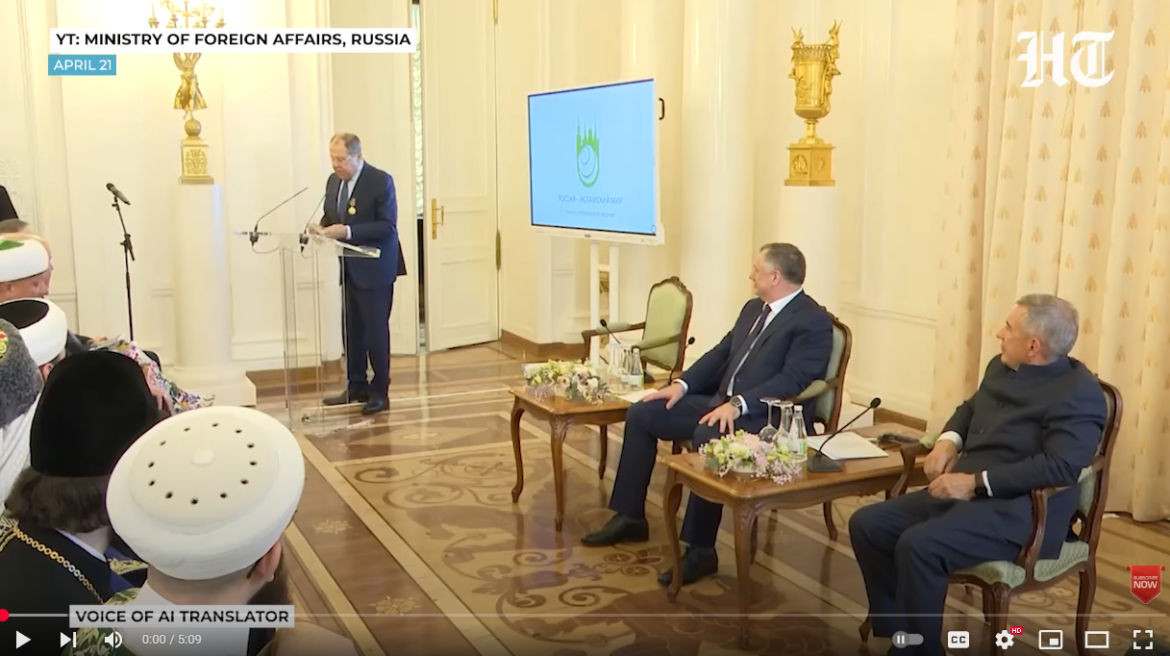In a sweeping and defiant address to representatives of the Islamic world, Russian Foreign Minister Sergey Lavrov launches a scathing attack on U.S. foreign policy, denounces Western sanctions as economic coercion, and calls for a multipolar global order built on sovereignty, mutual respect, and cultural tradition. The speech, delivered ahead of the upcoming KazanForum and under the auspices of Russia’s growing engagement with the Organization of Islamic Cooperation (OIC), is seen by many as a direct message to the United States and President Donald Trump.
Lavrov’s no-holds-barred remarks, delivered in Moscow during a high-level diplomatic summit, underscore a rapidly evolving strategy in Russian foreign policy: positioning the Kremlin as a global defender of traditional values and national sovereignty against what he terms “the ideological imposition of alien Western values.” His tone is confrontational, but calculated—aimed at consolidating alliances among Muslim-majority nations disenchanted with U.S. dominance in global affairs.
Lavrov accuses the West of using sanctions and military pressure to destabilize sovereign nations, especially those that resist adopting liberal Western norms. Without naming Trump directly, Lavrov refers to “certain Western leaders” who he claims are fueling global chaos by “dictating terms to others while violating their own rules.” His speech is accompanied by subtle references to recent U.S. military operations in the Middle East, ongoing sanctions on Iran and Syria, and Washington’s continued support for Israel amid mounting tensions in Gaza.
“This new world cannot be shaped by diktats from Washington or Brussels,” Lavrov says. “It must be rooted in equality, mutual benefit, and the wisdom of ancient civilizations that do not need the West’s moral lectures.”
Lavrov’s outreach to Muslim countries is both rhetorical and strategic. Russia is set to host the 2025 KazanForum, a major economic and cultural summit focused on Islamic nations. In recent years, Moscow has intensified its diplomatic, military, and trade relations with OIC members, including Iran, Turkey, Saudi Arabia, and Egypt. While Russia maintains its traditional alliance with Shia-majority Iran and Syria, it is also working to broaden ties with Sunni-majority countries in the Persian Gulf and North Africa.
The foreign minister’s speech is notable for its sharp rebuke of the West’s promotion of LGBTQ rights, secular governance, and liberal democracy—issues that many conservative Muslim governments view with skepticism or outright hostility. Lavrov says these policies amount to “moral colonization” and declares that Russia stands with the Muslim world in defending “family, faith, and tradition.”
Analysts view the speech as more than diplomatic theater. With the U.S. increasingly isolated from many Global South coalitions due to its foreign policy in the Middle East and Trump’s confrontational approach on trade and defense alliances, Russia is seizing the opportunity to position itself as a credible counterbalance. Lavrov’s remarks align closely with Russia’s broader foreign policy narrative, which seeks to portray the Kremlin as a protector of sovereignty and a leading voice for the so-called “Global Majority.”
Moscow’s efforts are not without geopolitical consequences. While the U.S. remains a dominant economic and military force, its influence in parts of the Muslim world has waned in recent years due to wars in Iraq and Afghanistan, the fallout from its role in Libya and Syria, and shifting alliances in the Gulf. Meanwhile, Russia has steadily increased arms exports, energy deals, and cultural diplomacy across Islamic nations, many of which are also partners in China’s Belt and Road Initiative.
The timing of Lavrov’s speech also coincides with fresh waves of Western sanctions on Russia over its war in Ukraine. The Kremlin is using these sanctions as proof of Western hypocrisy, arguing that the U.S. is weaponizing the global economy against any nation that refuses to comply with its agenda. Lavrov calls for an “end to the era of neo-colonialism,” urging Muslim nations to strengthen South-South cooperation and reject alignment with what he calls “the declining Western order.”
While the U.S. State Department has yet to respond directly to Lavrov’s remarks, senior officials have previously criticized Russia’s foreign policy as opportunistic and destabilizing, particularly in regions like the Middle East and North Africa. Still, the impact of Lavrov’s speech is being felt across diplomatic circles, as Russia continues to cultivate an emerging alliance of states united by opposition to Western norms and interventionism.
Whether this vision of a multipolar world leads to a lasting realignment remains uncertain. But Lavrov’s message is clear: Russia is not retreating in the face of sanctions and isolation—it is actively building new bridges, especially with nations that share its rejection of Western hegemony.



